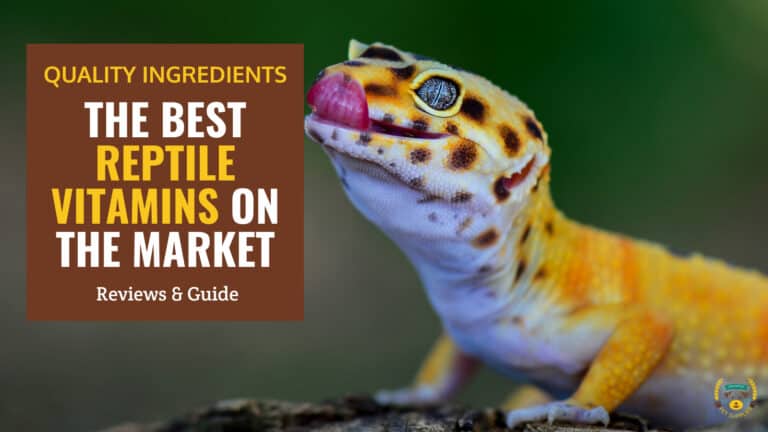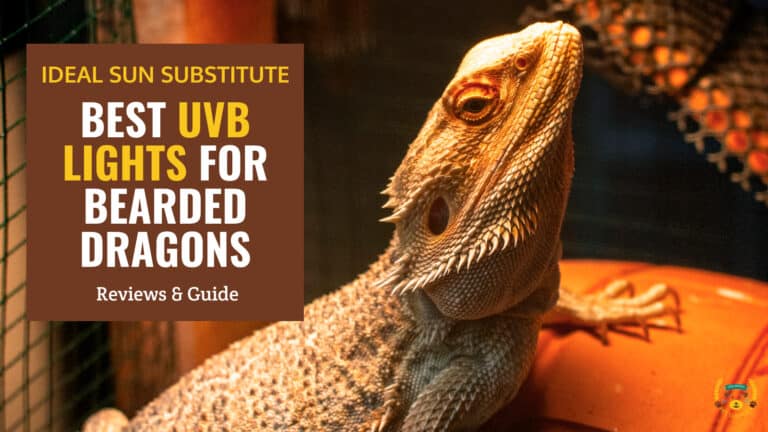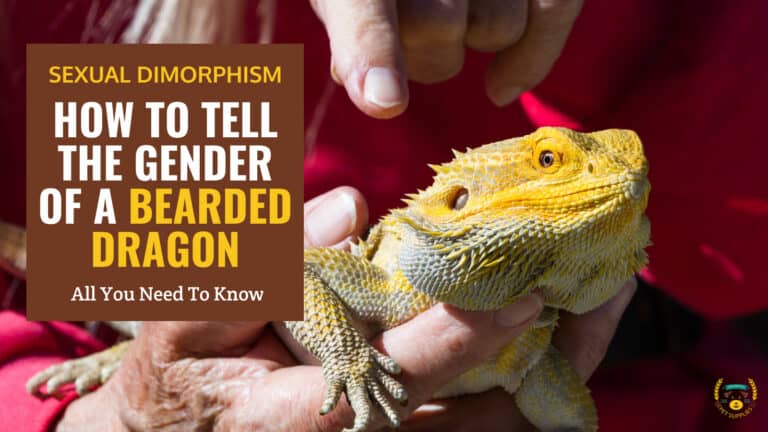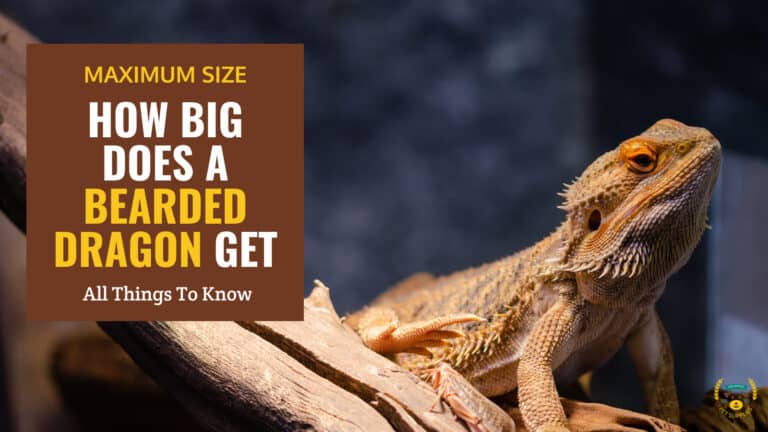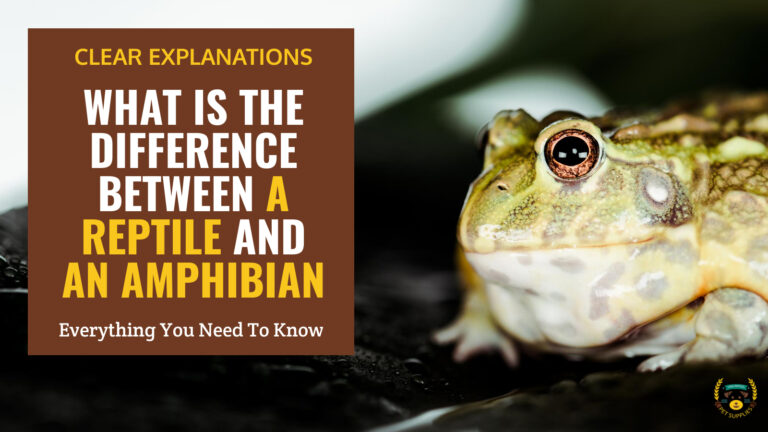12 Best Reptiles for Profitable Breeding
Last updated: April 12, 2024

Summary
- Breeding reptiles can be lucrative but requires choosing species based on ease of care, breeding success rates, and market demand.
- Popular and profitable species to breed include ball pythons, leopard geckos, bearded dragons, chameleons, crested geckos, corn snakes, Kenyan sand boas, anoles, Russian tortoises, gargoyle geckos, tokay geckos, and African fat-tailed geckos.
- Knowledge of the species' needs, acquiring breeding stock, providing specialized care, and maintaining optimal conditions for breeding success are essential.
- Legal permits, licenses for breeding and selling, as well as complying with regulations are mandatory.
- Breeding must be done responsibly by avoiding inbreeding, educating buyers, and promoting animal welfare.
- A sizable initial investment is required to acquire breeding pairs, enclosures, incubators, etc. Proper care and maintenance of breeding stock is labor-intensive.
- Researching market demand and competition is critical for determining profitable species to breed in a particular region.
Breeding reptiles for profit can be a lucrative business for those who have a passion for these fascinating creatures.
However, not all reptiles are equal when it comes to breeding. Some require more specialized care and attention, while others are easier to breed and can yield a higher return on investment.
If you're interested in starting a reptile breeding business, it's important to choose the right species. In this article, we'll take a look at the 12 best reptiles that are easier to breed for profit, based on their ease of care, breeding success rates, and market demand.
This guide will help you make an informed decision about which species to invest in for your breeding business.
Why Breeding Reptiles for Profit?
Breeding reptiles is a profitable venture that has benefits for both the breeder and the reptile community. By breeding reptiles in captivity, breeders can help maintain wild populations and reduce the demand for wild-caught animals for pet trade.
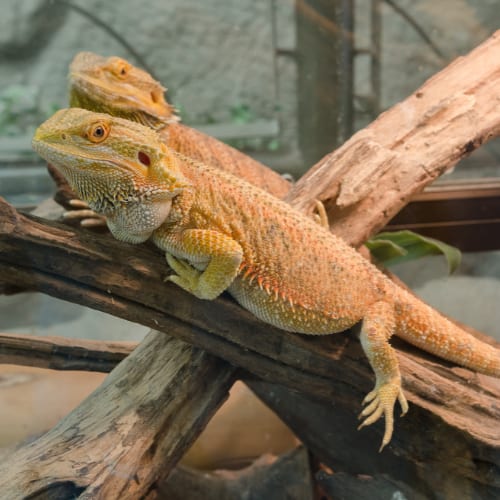
Captive breeding also provides a variety of unique color morphs that cannot be found in the wild. Breeders can create new breeding projects and further specialized care that can lead to additional sales and more profit.
Before embarking on this venture, there are some important factors to consider. The initial investment can be costly, from the cost of purchasing breeding stock to specialized care requirements. Additionally, the breeding process, successful breeding, and caring for pregnant females can be a full-time job.
However, popular animals such as bearded dragons, ball pythons, and leopard geckos are prolific breeders and are relatively easier to take care of.
Easiest Reptiles to Breed for Profit
We have crafted a list of the easiest reptiles to breed for profit. By selecting any of these reptiles, you will increase the probability of successful reproduction and save both time and money on specialized care.
Let's get started!
1- Ball Pythons
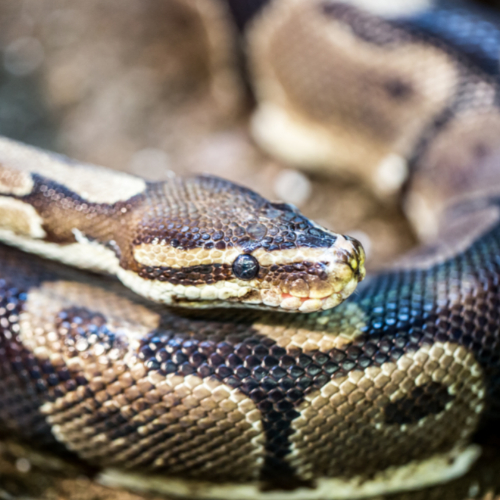
Ball Pythons could be a great option to start your reptile breeding project. These snakes have become increasingly popular as pets due to their docile temperament, convenient size, and unique colors and patterns, known as morphs.
However, before breeding Ball Pythons for profit, there are a few factors to consider.
First, breeding Ball Pythons requires a significant initial investment, including the purchase of breeding pairs and proper veterinary care. They also require specialized care, including appropriate temperature and humidity levels, the provision of water dishes, and a suitable diet.
In terms of revenue, Ball Pythons have proven to be a profitable choice. During the breeding season between mid-September through mid-November, a single female can lay, on average, around six eggs per clutch (numbers can vary between 1 to 11 eggs). The cost of purchase and additional expenses should also be considered, such as the cost of food, housing, and any necessary equipment.
You May Also Like: The Ultimate Ball Python Care Sheet For Beginners
Ball Pythons come in a variety of morphs, each with their unique colors and patterns. This diversity adds to their appeal as pets. From the common Normal or Classic Ball Pythons to the rare and highly valued Lavender Albino, there is a Ball Python morph for every buyer.
Ball Pythons can be sold for $50 to $500. We do have an article dedicated to the Banana Ball Python Morph, if you are interested in knowing more about that species.
2- Leopard Geckos
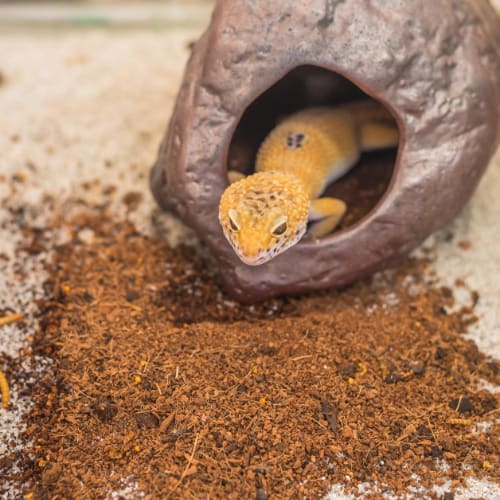
When it comes to profitable reptiles, leopard geckos are another great option for captive breeding thanks to their relatively simple breeding process.
To start, you need a terrarium that has an adequate amount of space for the geckos to move around. Temperature and humidity levels should also be regulated. The ideal temperature range for breeding is between 88-90°F (31-32°C) during the day and 70°F (21°C) at night. Humidity levels should be around 30-40%.
To keep your leopard geckos healthy and happy, they require a few accessories. Include a hiding spot, water dish, food dish, and a heat source. Proper nutrition is also a must; provide them with mealworms and crickets.
Leopard geckos are sociable animals, and it's best to house them with at least one other gecko. However, ensure that the enclosure is not overcrowded and can support the number of geckos you plan to keep.
There is a great variety in the world of Leopard Geckos, as breeders were able to come up with tens of different morphs. You can check our detailed article about the 30 Most Popular Leopard Gecko Morphs. These beautiful creatures can cost anywhere between $15 and as high as over $3,000. Two great example (included in our article) are the Dark Night, which is a very rare morph that costs over $4,000, and the Black Pearl, equally rare and costing over $3,000.
3- Bearded Dragons
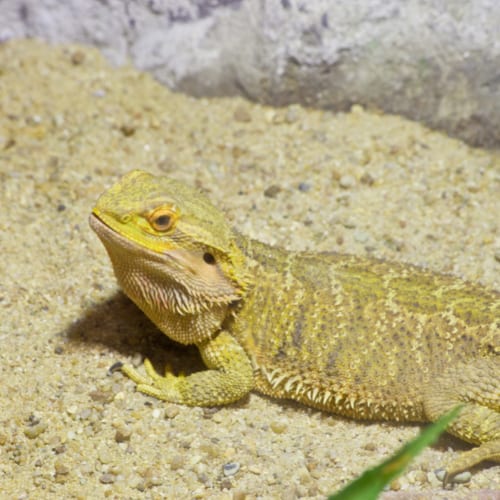
These friendly and social reptiles are popular pets, and with their various color morphs, they are in high demand. One of the main attractions to breeding Bearded Dragons is their ease of care, making them perfect for someone starting their first breeding project.
Proper care requirements for Bearded Dragons include providing a basking spot with temperatures between 95-105°F and UVB lighting. They should be fed both meat and plants, including crickets, mealworms, and leafy greens. Breeding Bearded Dragons can generate potential profits, with hatchlings selling for around $50-$150, depending on their genetics and color.
Successful breeding of Bearded Dragons requires adequate environmental conditions and proper breeding management. A breeding pair should be a minimum of 18 months old, and the breeding season should coincide with the warmer months. As prolific breeders, Bearded Dragons can lay up to 20 eggs per clutch and multiple clutches per year.
Finally, providing a comfortable habitat for your bearded dragons is a must, and we can help out with the task; you can check out our detailed reviews of the Best Bearded Dragon Enclosures.
Additionally, you can check out our detailed guide to the bearded dragon lifespan in the wild and captive to understand how proper care can significantly impact their longevity.
4- Chameleons
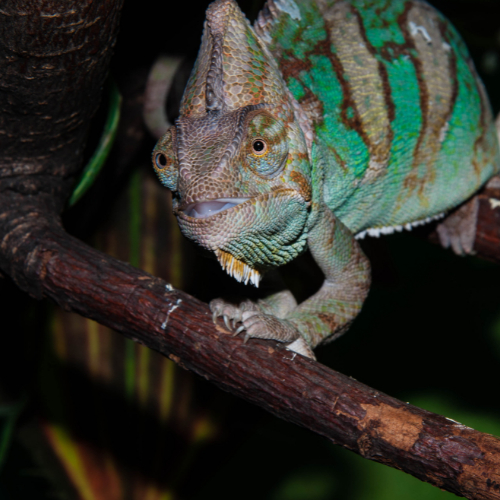
Breeding chameleons can be a profitable business, but it requires proper care due to their sensitive nature. Chameleons are unique in their hydration and housing requirements, making expertise and knowledge essential. Different breeds of chameleons can vary in price and market demand.
For instance, the veiled chameleon can sell around $30 to $100, while the Panther chameleon ranges from $150 to $500. Other breeds such as the Jackson's chameleon sell from $80 to $180. Experienced breeders have reported successful breeding with chameleons, producing anywhere from 20-200 eggs per breeding season (with eggs laid every 3-6 months).
Before jumping into chameleon breeding, consider legal requirements and ethical considerations. Breeding chameleons for sale should be in compliance with laws and regulations. Providing proper care for your breeding stock is essential to become a responsible and caring person, both for the animals and your business.
The initial investment might be high, but chameleons are popular reptiles, making this practice a booming industry. With proper care, adequate housing, and a dedicated approach to breeding, chameleons can be a successful business venture for passionate reptile breeders.
We can help out through our detailed guide on How Much A CHameleon Costs, and a full article reviewing the Best Chameleon Cages.
5- Crested Geckos
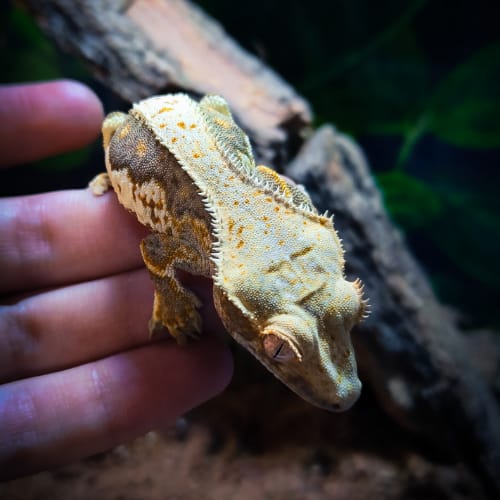
If you want a reptile that is easy to care for and visually striking, you might consider the Crested Gecko. These small and friendly geckos have a unique appearance, with spiky crests running down their backs and a variety of color morphs available, making them popular pets among reptile enthusiasts.
Crested Geckos are known for their ease of care and are perfect for those who are new to reptile keeping. They don't require any specialized care and can live comfortably in a terrarium with some places to hide and climb, a water dish, and a simple diet of insects and fruits.
Successful breeding only requires a breeding pair, with high chances of producing healthy offspring. They also have a short breeding season, making them easy to manage for those with other full-time jobs. The female can lay 1-10 eggs per cluster, and it is capable of laying eggs every 2-6 weeks.
Crested Geckos can be sold for $40 to $200.
6- Corn Snakes
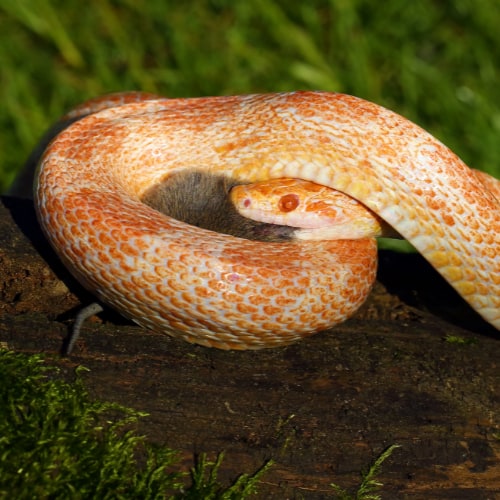
Corn Snakes come in a variety of colors and patterns, making them a popular pet reptile. Additionally, they are non-venomous, which means they are a safer choice for breeders.
However, Corn Snakes need particular environmental conditions to thrive. As a breeder, you need to ensure that you provide them with a warm and humid environment and a proper diet to keep them healthy and happy. While relatively easy to care for, they still require specialized care and handling, so it is essential to educate yourself on proper care requirements before starting your breeding operations.
Corn Snakes can be prolific breeders, producing many eggs per day during the breeding season (late May to July). With the right care, breeding stock can produce offspring in a range of colors and patterns, making them a profitable business for the caring person. With their popularity as a pet reptile and the increasing demand, Corn Snakes can make for a successful business with relatively low initial investment and minimal additional costs.
These beautiful creatures are sold for $50 to over $1,000.
7- Kenyan Sand Boas
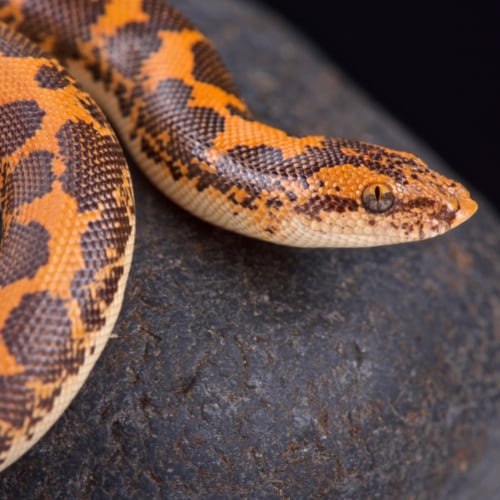
These beautiful snakes have a unique appearance and market appeal, thanks to their small size, docile temperament, and sand-colored skin. They also reproduce quickly and easily- a breeding pair can produce up to 30 babies per clutch (with 32 babies being the record)! Best of all, Kenyan Sand Boas require minimal specialized care, making them an ideal option for a beginner or part-time breeder.
To breed Kenyan Sand Boas, you need only a few essential items such as a suitable enclosure, a water dish, and proper food. Breeding age is 2-3 years, and the breeding season runs from October to April. Successful breeding requires a male and female breeding pair; once paired, mating typically occurs within the first few days.
Kenyan Sand Boas are prolific breeders, and each baby snake can fetch a few hundred dollars on the market, depending on the morph and coloring. Kenyan Sand Boas only require a modest initial investment, and their ease of care makes additional costs minimal.
You can expect to sell Kenyan Sand Boas for around 40 to 300 dollars.
8- Anole
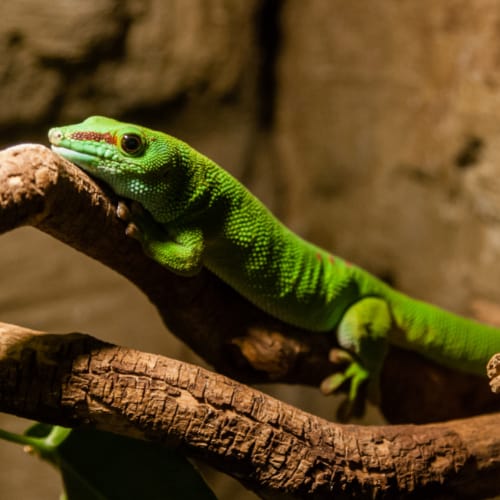
Anoles are tiny lizards that prefer a warm and humid environment. A terrarium with live plants, a heat lamp, and a misting system will keep them happy and healthy.
Anoles are active creatures, so ample room to climb and hide is important. Provide branches and other climbing surfaces in the enclosure. Make sure the enclosure isn't too crowded; one to two Anoles per ten gallons of space is optimal.
Anoles prefer a diet of small insects such as crickets and mealworms. You can also offer them a variety of fruits and vegetables. Make sure all food is coated in calcium powder to support their skeletal growth.
Maintaining the proper temperature is also vital for Anoles. The temperature should be kept between 75-80°F during the day (with a 90°F basking spot) and about 65-70°F at night. Providing a heat lamp and thermostat will help regulate the temperature.
Breeding Anoles requires little specialized care beyond proper diet and temperature control. With a little attention and care, Anole breeding can be a successful and profitable venture.
Anoles can be sold for around $10 (maybe a little more).
9- Russian Tortoises

Russian Tortoises are a profitable breeding choice due to their unique characteristics that make them popular pets and educational animals. These small and hardy tortoises are easy to breed and have a long lifespan, making them an ideal choice for those seeking a consistent income stream.
Unlike higher-maintenance reptiles, Russian Tortoises require minimal veterinary care and have straightforward care requirements, including a simple diet and a water dish. They are also prolific breeders, with females producing up to 5 eggs per clutch, and they breed at a young age.
Their market demand is high due to their vibrant personalities and hardiness. They are sold for anywhere between $75 and $200 depending on age, size, etc. Baby tortoises can cost double adults for around $150 and up to $400.
They are social animals that are enjoyable to interact with, making them a popular option for pet owners seeking a reptile that is fun to care for. Moreover, their small size and exotic appearance make them a hit in the educational animal market.
10- Gargoyle Geckos
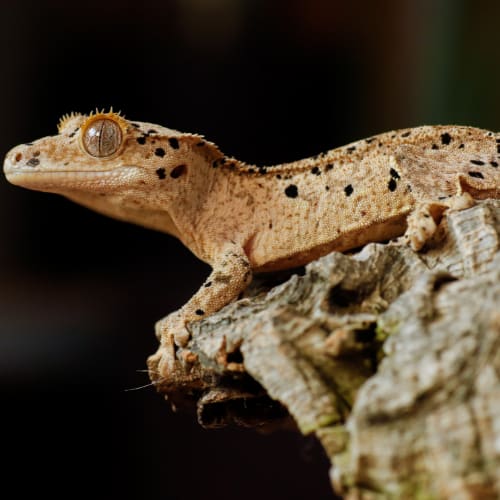
Gargoyle Geckos are a visually stunning and popular species of reptile that are easy to care for, making them a great option for first-time breeders. These unique creatures are in high demand due to their distinctive appearance, which includes a bumpy, textured skin and brightly colored markings that vary from grey to red and orange.
As a breeder, you can take advantage of the high demand by offering breeding pairs and selling their offspring for a high price. The breeding process is relatively simple, and the eggs can be sold for anywhere from $50 to $150 per egg. Gargoyle Geckos also have a long breeding season and are prolific breeders, which means you can have a steady stream of eggs to sell throughout the year.
In terms of care, Gargoyle Geckos are low-maintenance and require specialized care. They need a terrarium with a water dish, hiding spots, and a temperature range between 72°F to 78°F (which is the optimal range), as well as a balanced diet that includes insects such as crickets, mealworms, and roaches.
Just remember that you need to ensure they are never exposed to temperatures above 82°F or below 60°F- they can tolerate any temperature in that range.
The initial investment in a breeding pair and proper setup may seem high, but it can quickly translate into a profitable business. Based on factors like coloring, health and patterns, Gargoyle Geckos can be sold for $50 to $200. Females lay two soft-shelled eggs every 4 to 8 weeks, and 4-8 clutches of eggs every year.
11- Tokays
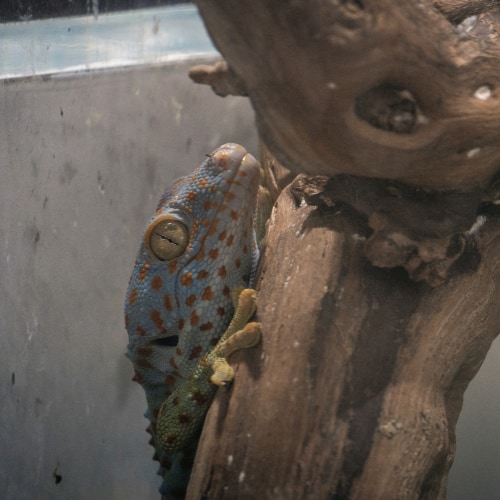
Tokays Geckos are gorgeous creatures with a unique and interesting breeding process, making them an easy species to breed. They are known for their striking blue and orange coloration, as well as their distinctive vocalization.
The following video (00min. 32 sec.) will give you an idea of what these creatures sound like:
To successfully breed Tokay geckos, there are a few key factors to consider. First and foremost, you'll want to choose healthy and well-cared-for breeding pairs. It's important to note that these geckos can be territorial and social animals, so proper care and maintenance will be crucial for successful breeding.
Additionally, you'll need to provide specialized care for your Tokays, including proper dietary requirements and providing ample space and water dishes in their enclosure. Breeding pairs will need to be of the appropriate breeding age and size, and the breeding season will need to be managed effectively (running October through May, which is the natural cycle; but some captive Tokays breed all year round).
Tokays can be sold for $20 to $50.
12- African Fat-Tailed Geckos
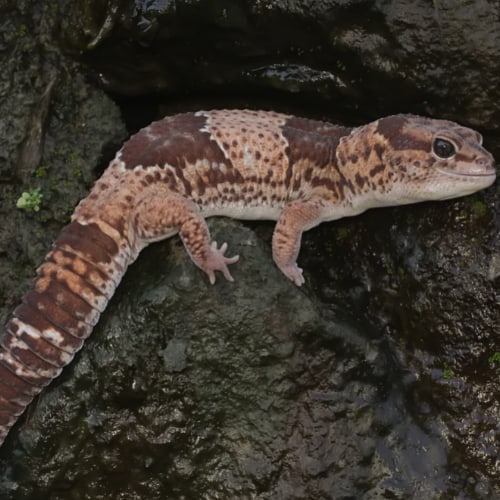
African Fat-Tailed Geckos (AFTs) make for a profitable choice for breeders due to their distinguishing features and ease of breeding.
These geckos have a unique body structure with a flat, triangular head and a wide body, making them easy to identify.
AFTs are also known for their docile nature and adaptability to different types of enclosures and dietary requirements. They are valued in the reptile community for their strikingly beautiful color morphs and their loyal following among pet owners.
With proper care and specialized attention, AFTs can produce three to five clutches of eggs a year, with the majority laying 2 eggs each times (females smaller in size only lay one egg sometimes). The price of AFTs is very high, as they can be sold for $290 – $1,200 each.
Factors to Consider Before Breeding Reptiles
Breeding reptiles for profit is a booming industry, but before you jump in, there are several factors to consider, from legal requirements to the specific needs of each species, etc.
Let's go through the main factors to consider in your future reptile breeding business!
Expertise and Knowledge
As a breeder, you need to research extensively, consult with experienced breeders, and join reptile communities to enhance your understanding. It is essential to have a clear understanding of the unique requirements, breeding behaviors, and potential health issues of the species you intend to breed.
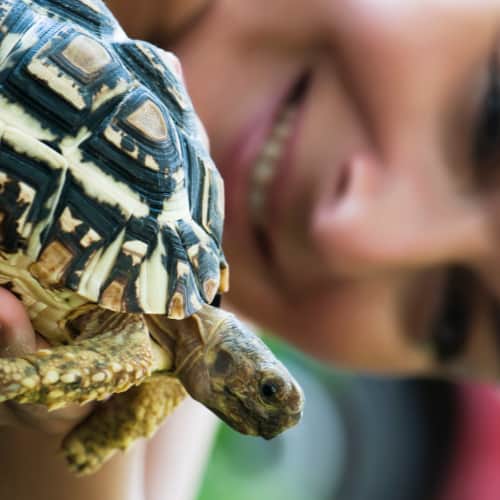
Gaining expertise in reptile breeding is not an easy task. It requires patience and dedication to educate yourself about the breeding process. Consulting experienced breeders can help you gain insights into the skill set required in breeding reptiles for profit. Joining reptile communities provides an avenue for exchanging ideas, sharing experiences, and seeking advice on how to improve your breeding skills.
Understanding the unique requirements of different species is crucial for success in breeding reptiles. Different species have different dietary requirements, breeding seasons, and reproductive behaviors.
Of course, being passionate about reptiles will certainly help, as you will be willing to invest more time and effort into doing something you really love.
Legal Requirements
Before starting your reptile breeding business, it's essential to know the legal requirements and restrictions related to reptile breeding, transport, and sales in your particular region. These laws may vary depending on the country, state, or even city you live in, so it's crucial to research them before starting your business.

In general, to breed and sell reptiles, you need to obtain several permits and licenses. For example, some countries require a permit to import or export reptiles, while others require a license to breed or sell certain species. Moreover, the reptile breeding industry is strictly regulated in many areas to prevent illegal trade of exotic animals.
To comply with local and international laws, you need to understand the specific regulations for each species you plan to breed and sell, as they may differ significantly. It's also important to know the proper transportation requirements for live reptiles.
One very good place to start from is going through and understanding the CITES convention, which stands for the Convention on International Trade in Endangered Species of Wild Fauna and Flora.
Ethical Considerations
Breeding reptiles for profit is a booming industry with high demand for popular animals such as bearded dragons and ball pythons. However, it's important to maintain ethical standards when participating in this industry.
First and foremost, genetic diversity is crucial in maintaining a healthy breeding population. Inbreeding can lead to serious health problems and decreased reproductive success. When selecting breeding pairs, it's important to choose animals with diverse genetics to prevent the negative effects of inbreeding.
Responsible ownership is also a must. As a breeder, it's your responsibility to educate potential buyers about proper care guidelines, such as providing appropriate dietary requirements and specialized care. Social animals require additional care and cost of purchase. You must be certain the buyer is a caring person with knowledge about the type of animal they are purchasing.
Initial Investment
Starting a reptile breeding business requires an initial investment (just like any other type of business). For instance, if you're considering breeding ball pythons, a popular and lucrative species, you must be aware of the costs involved.
The initial investment primarily includes purchasing breeding pairs, incubators, and other miscellaneous equipment.

It's essential to have a solid budget and sufficient funds to provide proper care for your reptiles. Aside from the expenses of purchasing the breeding pairs and equipment, you'll need to consider additional costs like veterinary care, specialized care requirements, and dietary necessities. You must also provide the appropriate environment to maintain their physical and emotional well-being.
You May Also Like: Best Reptile Incubators - Reviews & Guide
So, make all your calculations to know exactly how much money you will need before jumping in!
Care and Maintenance
Breeding reptiles for profit requires proper care and maintenance to ensure the health and wellbeing of your animals.
Regular cleaning is necessary to maintain a clean and healthy environment. Feed your reptiles according to their dietary requirements, and monitor their health closely to catch any signs of illness early. Provide appropriate environmental conditions, such as proper lighting, temperature, and humidity levels, to promote breeding success.
When caring for pregnant females, provide a comfortable nesting box and ensure that the female has enough food and water. Monitor her closely during the incubation period to ensure that the eggs are developing properly and adjust environmental conditions accordingly. After laying her eggs, continue to provide supplemental food and water to help the female recover from the stress of laying.
Market Demand
Choosing the right species is crucial for success.

Market demand plays a significant role in selecting the right reptile to breed. Ball pythons are a popular choice due to their large demand as pets, but their supply varies by location, affecting pricing. Therefore, it's essential to conduct market research, check online forums, and consult pet stores to gauge the species' popularity and potential profitability in your region.
Doing so enables you to ensure that there is a market demand and establish an estimation of the initial investment in feeders and equipment.
By selecting a species with good market demand, you can establish a successful, profitable business in this booming industry.
Competitors
In the highly competitive world of reptile breeding, legal and illegal breeders both vie for market share. Legal breeders often have to meet stringent requirements and adhere to legal regulations, which adds to their overhead costs. On the other hand, illegal breeders may offer lower prices, but their methods may not always be ethical.
Pricing strategies play a significant role in the industry. Some breeders may offer higher prices for unique color morphs or animals that are prolific breeders, while others may focus on popular animals that have higher demand. Market demand is also affected by geography, with demand being higher in some places than others. For example, in North Carolina, farm animals are more in demand than exotic species.
Final Thoughts
In conclusion, breeding reptiles for profit can be a successful and booming industry for those with the proper knowledge and expertise. It's essential to carefully consider legal requirements, market demand, and species-specific care requirements before starting a breeding operation.
Some of the most popular and profitable reptiles for breeding include bearded dragons, ball pythons, leopard geckos, and crested geckos. However, success in breeding these animals requires providing specialized and proper care to ensure their health and well-being.
We hope our list helps you decide which species to choose for your next project. Feel free to leave a comment below if you have any questions about breeding reptiles for profit.
Good luck!

